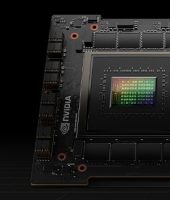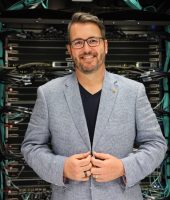The Pawsey Supercomputing Centre is supporting Australia research community through the provision of state of the art infrastructure, but also through skills development to take advantages of the services the Facility provides.
February was an opportunity to demonstrate the Centre commitment to Australian researchers by upskilling them while strengthening Pawsey relationship with lead supercomputing centres across the globe. The Centre continues investing the Australia future through the Summer Internship Program and also has worked on promoting their outcomes among the Science Community.
2018 has also given Pawsey staff the opportunity to showcase the key role Supercomputing is playing on Australia scientific landscape to a number of high profile visitors that have toured the facility and also to researchers and industry representatives that visited the booth the Pawsey hosted during an international conference for geoscientist.
To date, we have hosted an ongoing series of talks and seminars with local and international experts, hosted a hackathon, and ran two sets of Pawsey training, a workshop; a very special Pawsey Friday and a range of VIP tours.
Development
Pawsey Friday & Internship presentations
The first Pawsey Friday of the year marked the end of the 2017/18 Pawsey Summer Internship where students gave poster presentations based on their work during the program.
 It was a full house at the Centre for this great event with plenty of time for questions and networking with the students, their supervisors, speakers and guests of Pawsey Friday.
It was a full house at the Centre for this great event with plenty of time for questions and networking with the students, their supervisors, speakers and guests of Pawsey Friday.
The afternoon also heard from Dr Ashkan Rafiee of Carnegie Clean Energy (CCE) and Dr Hugh Wolgamot from the Centre of Offshore Foundation Systems at the University of Western Australia.
Dr Rafiee and Dr Wolgamot focussed their presentations with their work on CETO, a system designed to harvest energy from the ocean’s waves. Using Pawsey’s Magnus to analyse the fluid dynamics of extreme waves, the team have been able to design this wave power system and ensure it can survive the damaging effects of severe wave conditions – one of the biggest hurdles facing wave power technologies today.
Pawsey Training (Melbourne & Perth)
February saw Pawsey Training kick off for the year. Starting in Melbourne and Perth, the new two-day training format was fully booked and very successful.
The new Pawsey training format includes:
|
|
If you are interested in training, register for our next course on 4-5 April in Sydney or Perth on 18-19 April. Alternatively, Pawsey’s full event and training calendar is available here.
RNA-Seq Workshop
25 attendees were at the RNA-Seq workshop hosted by Pawsey and run by COMBINE – a student-run organisation for students in computational biology, bioinformatics and related fields.
Attendees learned how to analyse RNA-seq count data, using R. This included reading the data into R, quality control and performing differential expression analysis and gene set testing. They also learned how to generate common plots for analysis and visualisation of gene expression data, such as boxplots and heatmaps.
The workshop was aimed at biologists interested in learning how to perform differential expression analysis of RNA-seq data when reference genomes are available.
Seminars
Service Oriented Architecture Approach to Supercomputing (Colin McMurtrie)
Colin McMurtrie, Associate Director and Head of HPC Operations from the Swiss National Supercomputing Centre (CSCS) visited the Pawsey Supercomputing Centre this month.
Colin was welcomed by Pawsey staff and interested members of the community to hear the CSCS’ Service Oriented Architecture Approach to Supercomputing and their best practices.
This contemporary notion embraces modern approaches to infrastructure abstraction, with considerable efforts in provisioning infrastructure to offer services aligned with their requirements.
Pawsey will be continuing to have expert seminars at the centre over the course of 2018 including guests from the University of Edinburgh’s EPCC (Edinburgh Parallel Computing Centre).
Novel Approaches to HPC User Engagement (David Henty)
Presented by EPCC Manager, David Henty, Pawsey learned how the EPCC approach the topic of HPC user engagement including its challenges.
David gave some amazing insights into their work including:
- Promoting the benefits of HPC via a network of ARCHER Champions
- Giving easy access to ARCHER through an online driving test
- Supporting novice users with screencast videos for common tasks
- Regular long-term training impact surveys to quantify the benefits of their training program
- Training and engagement via social media (especially YouTube)
Following David’s talk, Anne Whiting will discuss how EPCC obtained their ISO 9001:2015 certification, the significance of this for HPC and the future of their accreditation.
Join us on Monday March 12 to hear her talk.
Conferences
Australasian Exploration Geoscience Conference
Every eighteen months on a cycle around Australian capital cities, the societies meet, to ensure geoscientists in all regions have the opportunity to obtain the very best value technical updates that are able to be provided in this part of the world.
Over the week, Pawsey met the many faces of geosciences.
One of our goals is to increase our engagement with resources and industry; and this platform really built the momentum to do so. We gained valuable insight to the industry and how we can enable more geoscientists to continue their science. Many were surprised to learn how easy it can be to access resources at the Pawsey Supercomputing Centre.
To read more about Pawsey at AEGC, click here.
ADACS Hackastron
The 2018 ADACS Hackastron saw a group of coders, data scientists, and technophiles challenge themselves over a weekend to come up with solutions for problems faced by Australian astronomers. They committed both their time and technical knowledge in the pursuit of helping astronomers with challenges as diverse as collating and correlating data on space weather, lightning and earthquakes, and their effects on the ionosphere, to optimizing GPU code for simulating the MWA tied-array beam pattern. They then presented their work to the challenge owners and the judges.
Everyone was impressed with the quality and functionality of all the work and suggestions presented, so much so that it was decided to split the prize money equally among all the attendees. The challenge owners meanwhile were provided with great ways to move forward with their research, and perhaps even more importantly, renewed enthusiasm and motivation to do so.
VIP Tours
A range of VIPs have visited the Pawsey Supercomputing Centre over the start of 2018 to learn about HPC in Australia and the big science being enabled by the Centre for our researchers.
 UK Minister The Rt Hon Mark Field MP, Minister of State for Asia and the Pacific at the Foreign & Commonwealth Office visited the Centre with Her Excellency Menna Rawlings CMG, British High Commissioner to Australia. The visit was a testament to Australia and the UK’s commitment to the two Nations’ relationship.
UK Minister The Rt Hon Mark Field MP, Minister of State for Asia and the Pacific at the Foreign & Commonwealth Office visited the Centre with Her Excellency Menna Rawlings CMG, British High Commissioner to Australia. The visit was a testament to Australia and the UK’s commitment to the two Nations’ relationship.
Delegates from the Square Kilometre Array (SKA) UK Headquarters also had the chance to see the Pawsey Centre (integral to the Australian phase of the SKA), including the Centre’s Galaxy supercomputer, which fulfils the real-time processing requirements of the Australian Square Kilometre Array Pathfinder (ASKAP) telescope.
All of these tours include a science showcase, which highlights the amazing research being enabled by Pawsey supercomputers and expertise and a walk through the whitespaces where they are housed.
Pawsey is always open for tours; if you want to visit for a private tour, contact pr@pawsey.org.au to have this organised. Alternatively, we run Community Tours on the last Wednesday of each month – you can register here.



